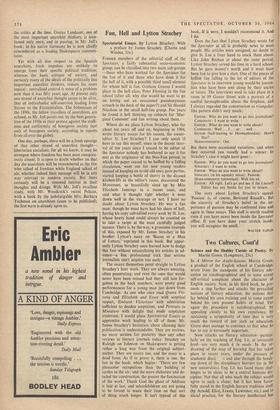Fun, Hell and Lytton Strachey
FORMER members of the editorial staff of the Spectator, a fairly substantial socio-economic group, can be classified into two main sub-groups ---those who have worked for the Spectator for the fun of it and those who have done it for the hell of it, with a possible third small element for whom hell is fun. Graham Greene I would place in the hell class, Peter Fleming in the fun school (after all, why else would he want to go on letting out an occasional pseudonymous screech in the back of the paper?) and Sir Harold Nicolson in the small hell-fun group. For years he found it hell thinking up subjects for 'Mar- ginal Comment' and fun writing about them.
• Where do we place Lytton Strachey, who for about ten years off and on, beginning in 1904, wrote literary essays for his cousin, the owner- editor St. Loe Strachey? I can only speak (I have to say this myself, since in the decent inter- val of ten years since I ceased to be editor of the Spectator nobody has bothered to say it for me) as the originator of the Neo-Fun period, in which the paper ceased to be baffled by a falling circulation, went out for new young readers instead of hanging on to old old ones, gave parties, started keeping a bottle of sherry in the disused kitchen-lift in the editor's room, discovered the Movement, so beautifully sized 'up by Miss Elizabeth Jennings in a recent issue, and skid what it thought right whether it went down well in the vicarage or not. I have no doubt about Lytton Strachey. He was a fun man; though he must have had his share of hell, having his copy sub-edited every week by St. Loe, whose heavy hand could always be counted on to take a swipe at the most carefully judged nuance. There is, by the way, a gruesome example of this, exposed by Mr. James Strachey in his brother Lytton's essay on 'Bacon as a Man of Letters,' 'reprinted in this book. But appar- ently Lytton Strachey soon learned how to dodge this fate without emasculating his articles in ad- vance—a fine professional trick that serious journalists can't acquire too early.
The essays themselves point straight to Lytton Strachey's later work. They are always amusing, often penetrating; and even the ones that would never have been missed had they still lain for- gotten in the back numbers, were pretty good performances for a young man just down from Cambridge. As one who once read Queen Vic- toria and Elizabeth and Essex with sceptical respect, Eminent Victorians with admiration sufficient to deaden scepticism, and Portraits in Miniature with delight that made scepticism irrelevant, I would place Spectatorial Essays as apprentice work leading to all of them. Mr. James Strachey's hesitation about allowing their publication is understandable. They are reviews, no more written for posterity than any other reviews in literary journals today. Strachey on Raleigh on Johnson on Shakespeare is getting rather a long way from the original subject- matter. They are essays too, and the essay is a dead form. As if to prove it, there is one, the last in the book, which begins : 'There are few pleasanter occupations than the building of castles in• the air; and the more elaborate and de- tailed the construction, the greater the fascination of the work.' Thank God the ghost of Addison is laid at last, and schoolchildren are not going to be forced to waste their time on that sort of thing much longer. It isn't typical of this book. If it were, I wouldn't recommend it. And I do.
Even the fact that Lytton Strachey wrote for the Spectator at all is probably news to most people. His articles were unsigned, no doubt to give St. Loe a freer hand to muck them about. Like John Buchan at about the same period, Lytton Strachey served his time in a hard school. But he gave money's worth and it must have been fun to give him a start. One of the pieces of hellish fun falling to the lot of editors of the Spectator is to interview young would-be journa- lists who have been sent along by their uncles or tutors. The interviews used to take place in a room in 99 Gower Street with a portrait of a soulful hermaphrodite above the fireplace, and I always regarded the conversation as triangular. The pattern didn't vary much: EDITOR: Why do you want to go into journalism? CANDIDATE: I want to write.
EDITOR: What do you want to write about?
CANDIDATE: Well ... I er well ...
EDITOR (half-turning to Hermaphrodite): How's that?
HERMAPHRODITE: OUt.
But there were occasional variations, and when they occurred you usually had a winner. In Strachey's case it might have gone:
EDITOR: Why do you want to go into journalism? STRACHEY: I want to write.
EDITOR: What do you want to write about? STRACHEY (in his squeaky voice): Passion. HERMAPHRODITE (uninvited): Well hit, sir. EDITOR: All right. Let's go and see if the LiterarY
Editor has any books for you to review.
The story about Lytton Strachey's squeak 'Passion' is, of course, Bertrand Russell's. But the sincerity of Strachey's belief in the im- portance of passion may be confirmed time and again in these essays. This stuff is worth reading even if you haye never been inside the Spectator office. If you have done your stretch inside, you will recognise the smell.
WALTER TAPLIN


































 Previous page
Previous page